

School Isn’t Like a Job « Zero-Knowledge Proofs. June 3, 2012 by John Scammell When this story broke in Edmonton on Thursday, the general public (and some teachers) started sharing their thoughts about the use of the zero.

The prevailing comment in the media from the general public goes something like, How Important Are Grades? Become a Teacher >> Browse Articles >> Continuing Education Featured Author: Mrs.

Laura Owen Mrs. Owen is currently teaching 3rd grade at the Westminster Schools in Atlanta, GA. Scaling Grades for Success. The no-zero policy is a hotly debated and emotionally charged topic on the national scene.
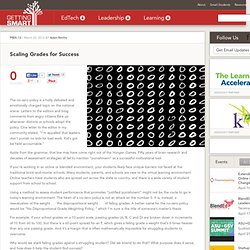
Letters to the editors and blog comments from angry citizens flare up whenever districts or schools adopt the policy. One letter to the editor in my community stated, “I’m appalled that leaders don’t punish no kids for bad work. Kid’s got be held accountable.” Aside from the grammar, that line may have come right out of the Hunger Games. From Degrading to De-Grading. March 1999 From Degrading to De-Grading By Alfie Kohn Pour lire cet article en français, cliquer ici.
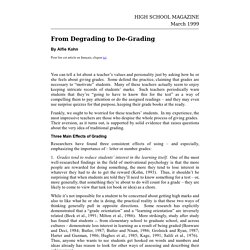
The Folly of Rubrics and Grades. Share it now!

Before I abolished grades, I went through my rubrics stage. I was convinced I could solve my assessment problems if I could just fine-tune my rubric production. I struggled for months trying to create ‘student-proof’ rubrics that would allow me to consistantly assess their learning. Challenging the Grading Paradigm, Part 3 (Alternatives to the 100-Point Scale) A little over a month ago, I posted the first part of a series entitled, “Challenging the Grading Paradigm.”
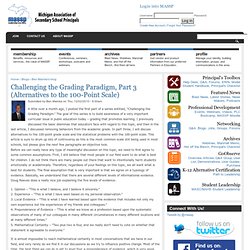
The goal of this series is to build awareness of a very important curricular issue in public education today – grading that promotes learning. I previously discussed the basic dilemmas that educators face with regard to this topic, and then in the last article, I discussed removing behaviors from the academic grade. In part three, I will discuss alternatives to the 100-point grade scale and the statistical problems with the 100-point scale. This article is sure to drum up lots of controversy as this is the most common scale still being used in most schools, but please give the next few paragraphs an objective look. Student Accountability & Responsibility in Class. Forget Minimum Grades by Thomas Guskey. By Thomas R.
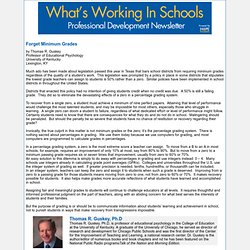
Guskey Professor of Educational Psychology University of Kentucky Lexington, KY Much ado has been made about legislation passed this year in Texas that bars school districts from requiring minimum grades regardless of the quality of a student’s work. This legislation was prompted by a policy in place in some districts that stipulates the lowest grade teachers can assign to students is 50% rather than a zero. Similar policies have been implemented in school districts in throughout the United States. Districts that enacted this policy had no intention of giving students credit when no credit was due. Effective Grading Practices:Five Obstacles to Grading Reform.
Active Grading: Scale Matters « Point of Inflection. Learning Center. There are two similar discussions in this forum, “Standards Based Grading in Science”, and Using Science Process Skills to Determine Grades, .

The biggest conversation we are having at my middle school right now is whether or not we should be using plusses or minuses in our grading. Some teachers do, so do not. The concern is coming from the students that no longer have a 4.0 GPA because they received an A- in one of their classes. That means they won’t be recognized at our end of the year promotion ceremony as a two year, 4.0 student. Part of the conversation is based on the fact that it’s a random draw of who you get for a teacher. No Zeros Until… Several months ago, after much reflection, examination of school data, and conversations with a few teachers, I proclaimed to my staff that I did not want them to assign a zero to any student until they intervene in some way; talk with the student to find out why they did not turn in the assignment, call a parent to let them know an assignment was missed, do something before recording a zero in the grade book.
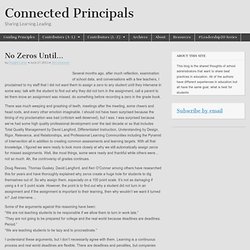
There was much weeping and gnashing of teeth, meetings after the meeting, some cheers and head nods, and every other emotion imaginable. I should not have been surprised because the timing of my proclamation was bad (criticism well deserved), but I was. Doug Reeves, Thomas Guskey, David Langford, and Ken O’Conner among others have researched this for years and have thoroughly explained why zeros create a huge hole for students to dig themselves out of. So why assign them, especially on a 100 point scale. Teaching Students to Think:Effective Grading Practices. Toxic%20Grading%20ppt. A floor for failing grades - Monday, Feb. 4, 2008. Steve Marcus Tam Larnerd, principal of Miller Middle School in Henderson, talks with students during lunch.

Accurate Assessment: Grades That Mean Something. Detailed scoring rubrics allow students to learn from their mistakes. Remaking the Grade, From A to D - Commentary. By Douglas B. Reeves Try the following experiment at your next faculty meeting. Alice Armstrong: Teachers should just say no to no-zero grade policy. Caseagainstzero.